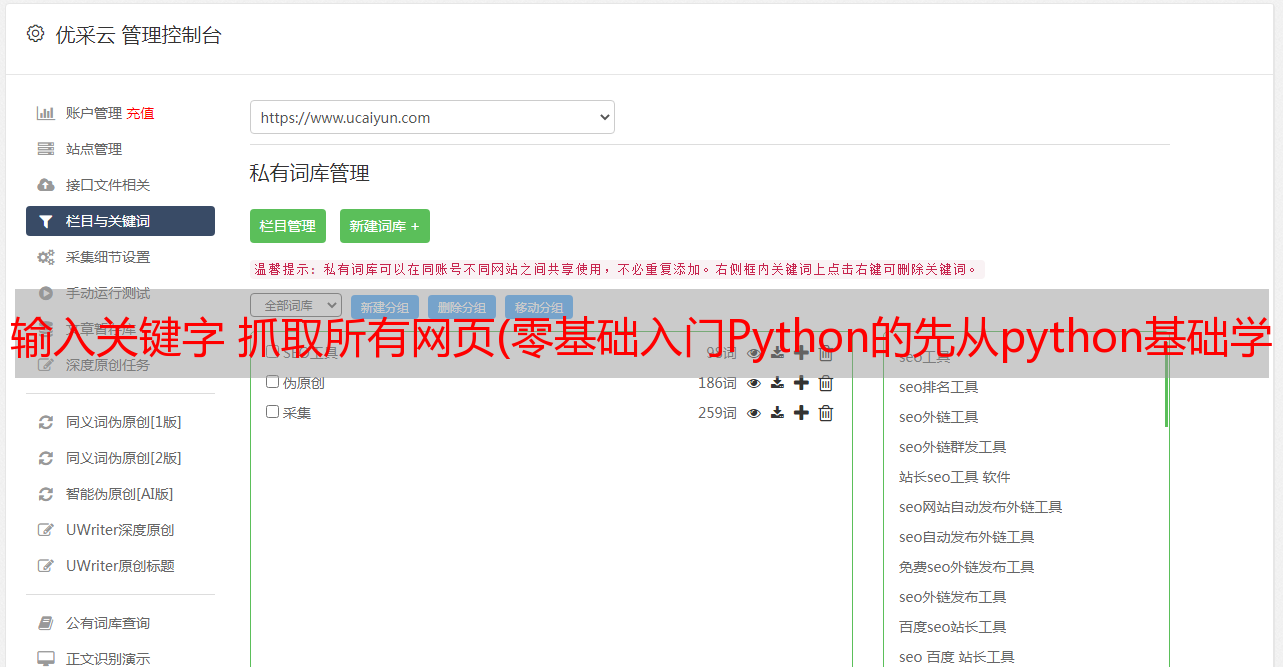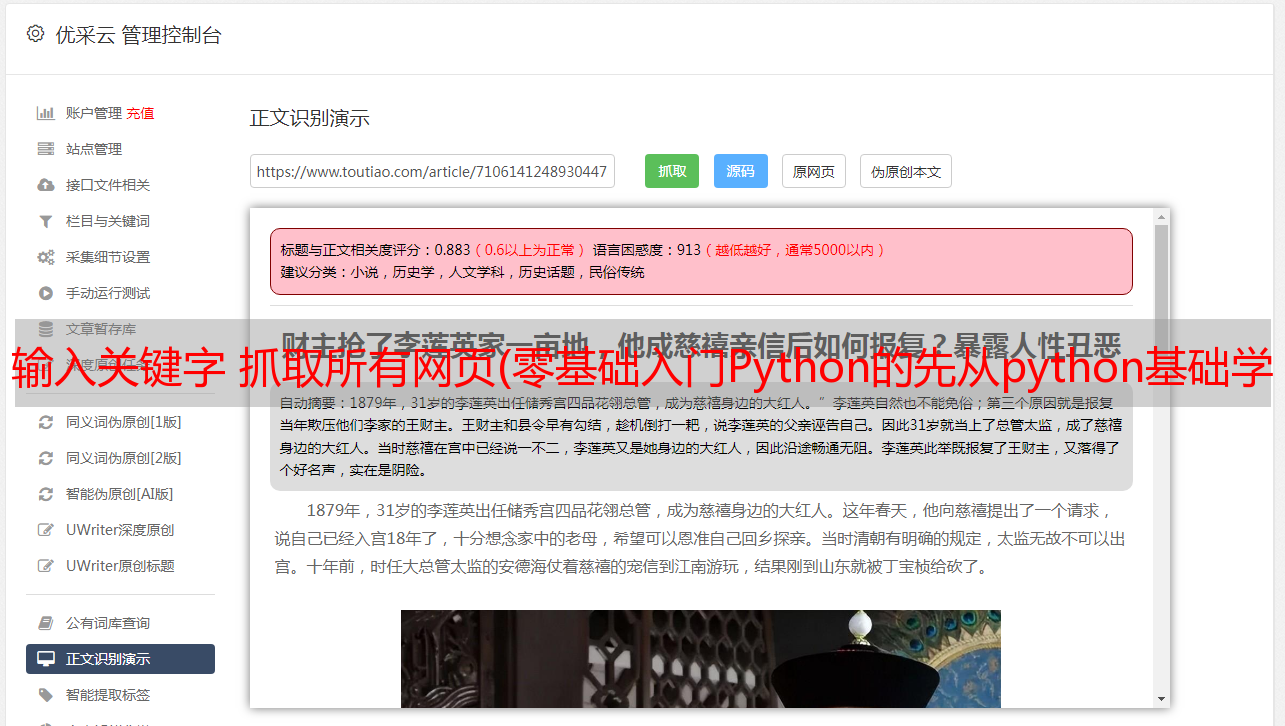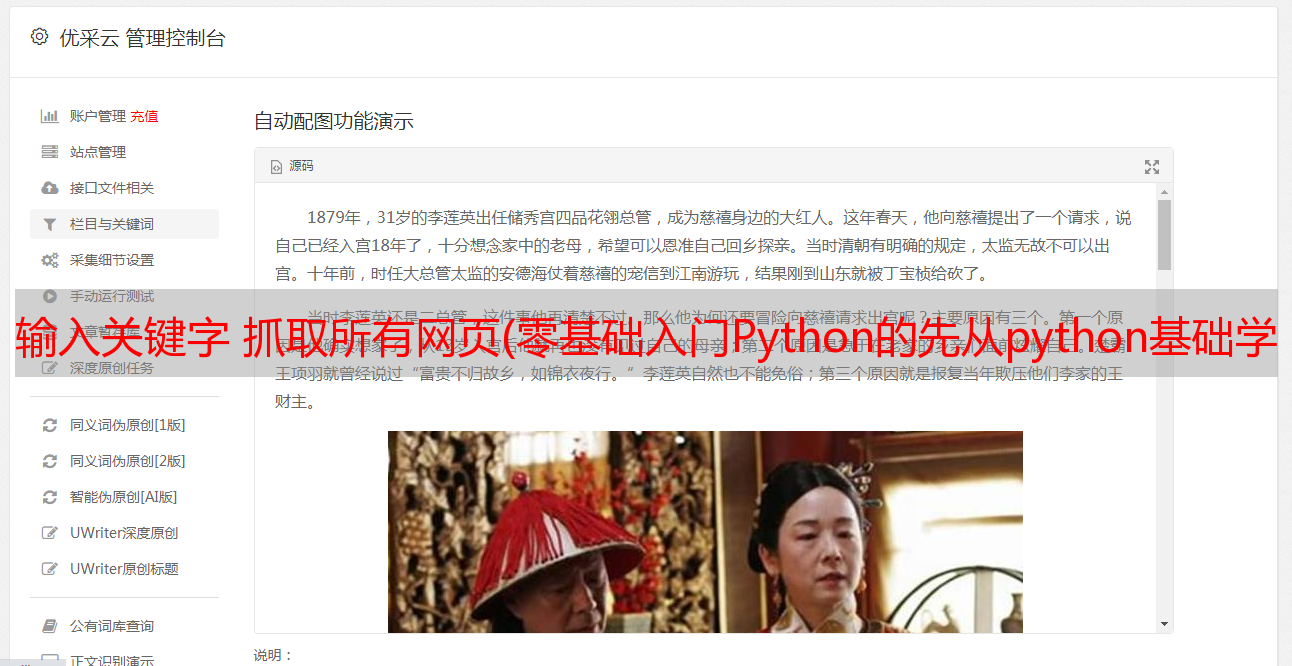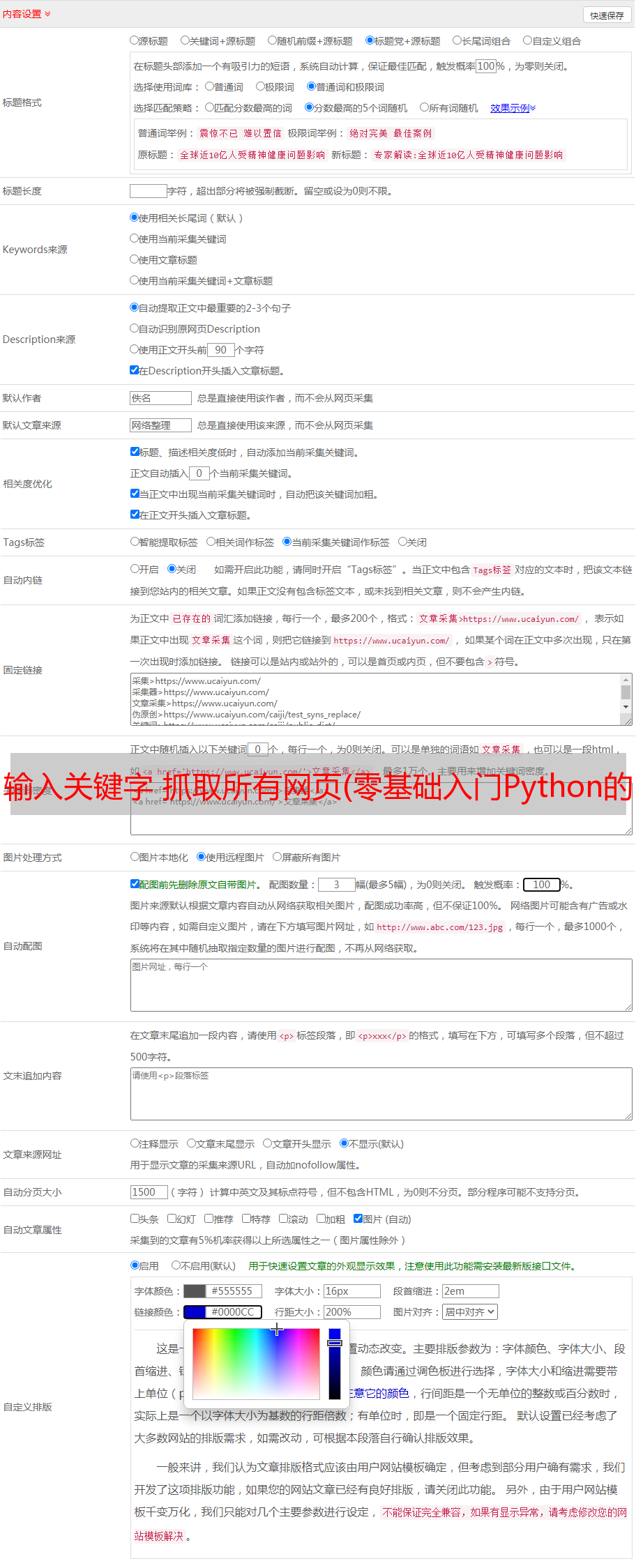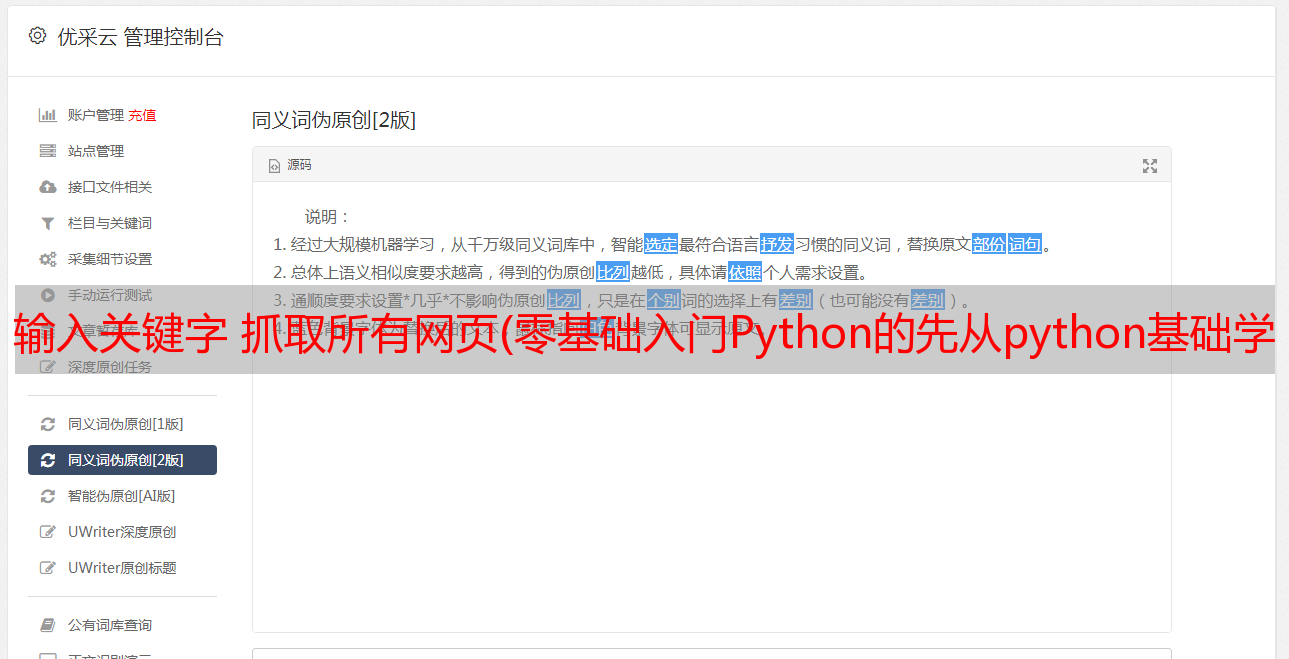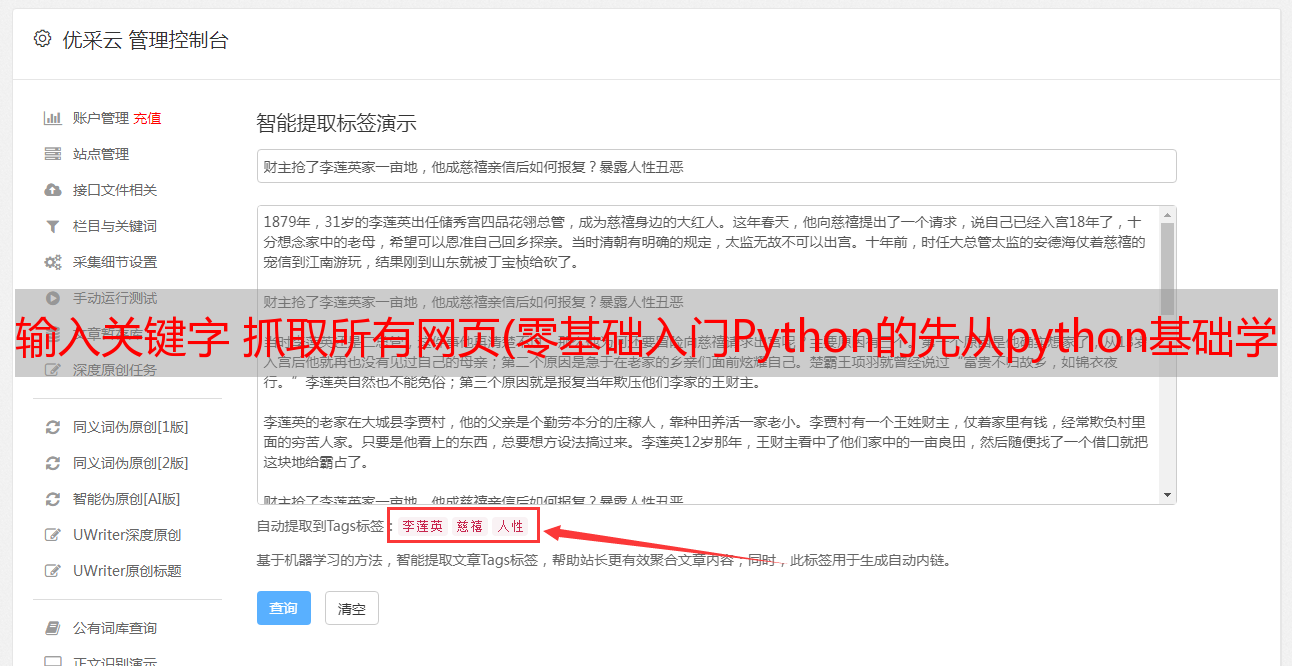输入关键字 抓取所有网页(零基础入门Python的先从python基础学起,打好基础 )
优采云 发布时间: 2022-03-19 09:13输入关键字 抓取所有网页(零基础入门Python的先从python基础学起,打好基础
)
文章目录
温馨提示:以下为本文正文内容文章,以下案例供参考
前言:
从零基础上手Python,先从Python的基础开始,打好基础,再慢慢接触下面的内容,给自己找任务,多做练习。也建议大家在学习Python的时候多写多读。
网页分析
节省时间,废话不多说,直接上例子!!!
让我们用 requests 和 BeautifulSoup 写一个,每个人都有自己喜欢的车!(包括我也是)所以本章我们将车辆信息存储在本地,浏览汽车的价格和状况,有钱就买。
ok,以下是开始学习python的正确姿势,请用电脑操作。
首先,我们需要打开网址,进行网页分析,了解网页可以实现哪些方法。
进入网站后,我们点击买车,就可以看到该车的所有信息。
判断网页是动态的还是静态的还是一样的。可以在网页源码中输入关键字找到,说明是静态的,那么我们就可以用常规的方法来实现URL了。
每页显示 48 辆汽车。当我们点击下一页的时候,可以看到地址变了,
page=2#pagetag
page=3#pagetag
page=4#pagetag
可以观察到page=2中的数字代表翻页。后面翻页的时候,我们可以直接使用循环变量翻页来获取不同页面的内容。
明确我们需要的信息是
车名
价钱
封面图片
里程
引擎
移位
播放时间
通过页面源码我们可以了解到这些信息是放在ul标签的li标签中的。
然后我们可以发起一个请求,使用 BeautifulSoup 来提取我们需要的信息。分析完成后,我们就可以开始操作了。
大意
1 使用request发起请求
2 编写循环变量实现翻页
3 然后为 BeautifulSoup 解析返回的 HTML
4 解析后,将内容保存到文件中
实施步骤
导入对应的库后,构造一个fake header,防止简单的反爬,然后向URL发起请求,返回文本。
import requests
from bs4 import BeautifulSoup
import xlwt
import os
import re
#
def get_content(url):
headers = {'user-agent': 'Mozilla/5.0 (Windows NT 6.1; Win64; x64) AppleWebKit/537.36 (KHTML, like Gecko) Chrome/97.0.4692.71 Safari/537.36'}
try:
response = requests.get(url,headers)
response.encoding = response.apparent_encoding # 自动转码
if response.status_code == 200:
return response.text
except requests.RequestException as e:
print('error',e)
return None
拿到网页源代码后,我们可以使用BeautifulSoup解析来解析内容,找到所有的汽车标签li,循环每个li使用BeautifulSoup标签和属性找到我们需要的内容,得到详情页,然后进入提取内容的详细信息页面。
def get_data(response):
# 实例化对象
soup = BeautifulSoup(response,'lxml')
# 全部li标签
all_data = soup.find('ul',class_="gongge_ul").find_all('li')
for i in all_data:
title = i.find('div',class_="gongge_main").find('span').text
images = i.find('div',class_="item_img").find('img').get('data-src')
gl = i.find('div',class_="gongge_main").find_all('i')[1].text
# 详情页
ditail = i.find('a').get('href')
这是汽车详情页面
如果有详情页,我们会向详情页发起请求,进入详情页提取内容,同时也使用网页源代码的标签和属性来提取内容。进入详情页提取我们的信息后,调用其他参数传递参数。
# 详情页
ditail_data = requests.get(url=ditail).text
soup_li = BeautifulSoup(ditail_data,'lxml')
for xt in soup_li.find_all(class_="detail-wrapper"):
momey = xt.find(class_="price-this").text
ml = xt.find(class_="col-xs-6 parameter-configure-list").find_all('li')[2].text.replace('\n','').replace(' ','')
pl = xt.find(class_="summary-attrs").find_all('dl')[2].text
time = xt.find('div',class_="summary-attrs").find('dl').text.replace('上牌时间','')
content = xt.find('div',class_="row parameter-configure").text.replace('\n','').replace(' ','')
item = {
'标题':title,
'图片':images,
'里程':gl,
'价格':momey,
'情况':ml,
'万里':pl,
'时间':time,
'详情':content
}
print(item)
save_CSV(title,images,gl,momey,ml,pl,time,content)
save_Images(title,images)
信息提取完成后,将数据保存到Exel表中
def save_CSV(title,images,gl,momey,ml,pl,time,content):
global n
sheet.write(n, 0, title)
sheet.write(n, 1, images)
sheet.write(n, 2, gl)
sheet.write(n, 3, momey)
sheet.write(n, 4, ml)
sheet.write(n, 5, pl)
sheet.write(n, 6, time)
sheet.write(n, 7, content)
n = n + 1
book.save(u'汽车.xlsx')
print('正在保存===>:',title)
最后一件事是将封面保存到本地。
def save_Images(title,images):
if not os.path.exists('tche'):
os.mkdir('tche') # 创建文件夹
images_data = requests.get(url=images).content
big = '[?/\|:"*]' # 剔除特殊字符
li = re.sub(big,"",title)
with open('tche\' + li + '.jpg', mode='wb')as f:
f.write(images_data)
print('正在保存图片=====>:',title)
打印结果
这里实现了一个循环变量来翻页。(需要更多页的可变数字)
这里我们将汽车信息保存到Exel。
完成
实现所有代码:
import requests
from bs4 import BeautifulSoup
import xlwt
import os
import re
# 发送请求
def get_content(url):
headers = {'user-agent': 'Mozilla/5.0 (Windows NT 6.1; Win64; x64) AppleWebKit/537.36 (KHTML, like Gecko) Chrome/97.0.4692.71 Safari/537.36'}
try:
response = requests.get(url,headers)
response.encoding = response.apparent_encoding # 自动转码
if response.status_code == 200:
return response.text
except requests.RequestException as e:
print('error',e)
return None
# 打开xlwt
book = xlwt.Workbook(encoding='utf-8', style_compression=0)
sheet = book.add_sheet('汽车', cell_overwrite_ok=True)
sheet.write(0, 0, '名称')
sheet.write(0, 1, '图片')
sheet.write(0, 2, '万里')
sheet.write(0, 3, '价格')
sheet.write(0, 4, '马力')
sheet.write(0, 5, '排量')
sheet.write(0, 6, '上牌时间')
sheet.write(0, 7, '详情信息')
n = 1
def get_data(response):
#
soup = BeautifulSoup(response,'lxml')
# 找li
all_data = soup.find('ul',class_="gongge_ul").find_all('li')
for i in all_data:
title = i.find('div',class_="gongge_main").find('span').text
images = i.find('div',class_="item_img").find('img').get('data-src')
gl = i.find('div',class_="gongge_main").find_all('i')[1].text
#
ditail = i.find('a').get('href')
#
ditail_data = requests.get(url=ditail).text
soup_li = BeautifulSoup(ditail_data,'lxml')
for xt in soup_li.find_all(class_="detail-wrapper"):
momey = xt.find(class_="price-this").text
ml = xt.find(class_="col-xs-6 parameter-configure-list").find_all('li')[2].text.replace('\n','').replace(' ','')
pl = xt.find(class_="summary-attrs").find_all('dl')[2].text
time = xt.find('div',class_="summary-attrs").find('dl').text.replace('上牌时间','')
content = xt.find('div',class_="row parameter-configure").text.replace('\n','').replace(' ','')
item = {
'标题':title,
'图片':images,
'里程':gl,
'价格':momey,
'情况':ml,
'万里':pl,
'时间':time,
'信息':content
}
print(item)
save_CSV(title,images,gl,momey,ml,pl,time,content)
save_Images(title,images)
def save_CSV(title,images,gl,momey,ml,pl,time,content):
global n
sheet.write(n, 0, title)
sheet.write(n, 1, images)
sheet.write(n, 2, gl)
sheet.write(n, 3, momey)
sheet.write(n, 4, ml)
sheet.write(n, 5, pl)
sheet.write(n, 6, time)
sheet.write(n, 7, content)
n = n + 1
book.save(u'二手车.xlsx')
print('正在保存===>:',title)
def save_Images(title,images):
if not os.path.exists('che'):
os.mkdir('che') # 创建文件夹
images_data = requests.get(url=images).content
big = '[?/\|:"*]' # 剔除特殊字符
li = re.sub(big,"",title)
with open('che\' + li + '.jpg', mode='wb')as f:
f.write(images_data)
print('正在保存图片=====>:',title)
def main(page):
url = '。。。。。。。。。'
print(f'==============================正在保存第{page}页的数据内容==============================')
response = get_content(url)
get_data(response)
if __name__ == '__main__':
for i in range(1,6):
main(page=i)

